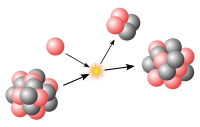
Back نويدة ذات أصل إشعاعي Arabic Nuklido aperanta pro radioaktiveco Esperanto Nucleido radiogénico Spanish هسته پرتوزا Persian Nucléide radiogénique French Núclido radioxénico Galician Nuklida radiogenik ID Nuklid radiogenik Malay Nuclídeo radiogênico Portuguese Radiogenic SIMPLE
| Nuclear physics |
|---|
 |
A radiogenic nuclide is a nuclide that is produced by a process of radioactive decay. It may itself be radioactive (a radionuclide) or stable (a stable nuclide).
Radiogenic nuclides (more commonly referred to as radiogenic isotopes) form some of the most important tools in geology. They are used in two principal ways:
- In comparison with the quantity of the radioactive 'parent isotope' in a system, the quantity of the radiogenic 'daughter product' is used as a radiometric dating tool (e.g. uranium–lead geochronology).
- In comparison with the quantity of a non-radiogenic isotope of the same element, the quantity of the radiogenic isotope is used to define its isotopic signature (e.g. 206Pb/204Pb). This technique is discussed in more detail under the heading isotope geochemistry.